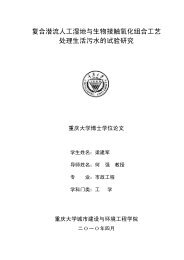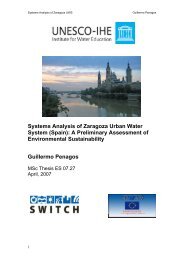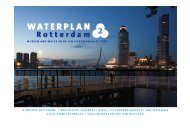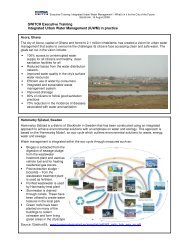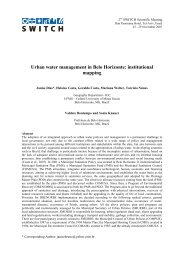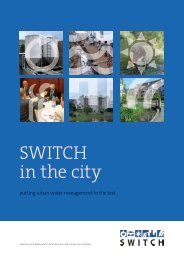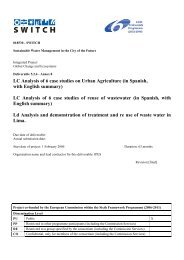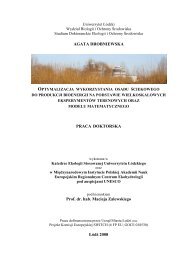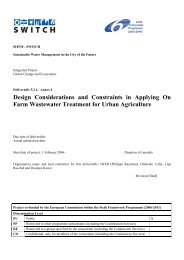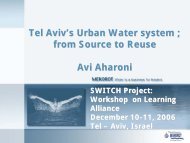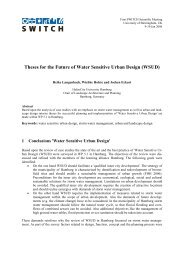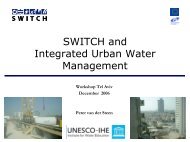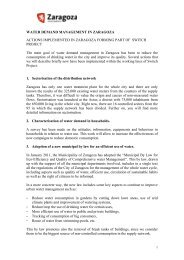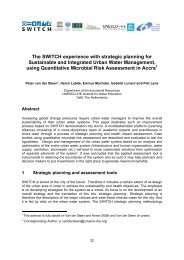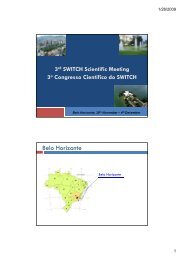Good practices for Social inclusion - Case studies and summary
Good practices for Social inclusion - Case studies and summary
Good practices for Social inclusion - Case studies and summary
Create successful ePaper yourself
Turn your PDF publications into a flip-book with our unique Google optimized e-Paper software.
Background<br />
As qualified in the next section, freshwater is the scarcest resource in the Middle East <strong>and</strong><br />
contributes to conflict in the region (Jägerskog <strong>and</strong> Phillips 2006, UNDP 2006). Sustainably<br />
managing water resources is of essential importance <strong>for</strong> life <strong>and</strong> livelihoods <strong>and</strong> is directly<br />
related to good governance (UNDP 2006).<br />
Water resources issues<br />
The annual availability of fresh water in the Middle East fell from an average of 3,300 cubic<br />
meters per person in 1960 to less than 1,250 cubic meters per person in 1995 (World Bank,<br />
1996), the lowest per capita water availability in the world (UNDP 2006). Renewable water<br />
resources are about 335 km 3 /year <strong>and</strong> it is estimated that by 2025, this will drop to less than<br />
half of the 1995 level. Compared to other countries in the region, Egypt has a relatively high<br />
per capita availability of water, but the dem<strong>and</strong> exceeds the supply. Jordan <strong>and</strong> Palestine are<br />
among the countries with the world's lowest per capita availability of water (UNDP 2006).<br />
Water shortages <strong>and</strong> unequal distribution at community level are impacted by the political<br />
situation <strong>and</strong> dynamics at national level. Egypt, Palestine <strong>and</strong> Jordan rely heavily on water<br />
resources that lie in part beyond their borders 83 . In the West Bank, water scarcity is<br />
compounded by Israel‘s control over access to water. In Jordan, waves of refugees from<br />
Palestine <strong>and</strong> Iraq further increase the pressure on limited fresh-water resources (Jägerskog<br />
<strong>and</strong> Phillips 2006).<br />
Scarcity <strong>and</strong> decline of freshwater are major development constraints. The adverse affects of<br />
increasing conflicts over control of <strong>and</strong> access to water resources are especially felt by the<br />
poor <strong>and</strong> marginalised (Skoet <strong>and</strong> Stamoulis 2006, UNDP 2006, DFID 2007).<br />
Water governance<br />
Water governance refers to the set of systems that controls decision-making with regard to<br />
water management <strong>and</strong> water service delivery; it includes all the relationships, mechanisms,<br />
processes, <strong>and</strong> institutions through which stakeholders can mediate their interests, exercise<br />
their rights <strong>and</strong> obligations <strong>and</strong> make decisions <strong>for</strong> the delivery <strong>and</strong> provision of services<br />
(Moriarty et al. 2007 1 , De la Harpe 2007). Water governance is widely recognized as an<br />
essential element of poverty reduction (DFID 2007, UNDP Water Governance programme).<br />
Reviews of water policy <strong>and</strong> water institutions in the region have concluded they need<br />
strengthening around issues of accountability <strong>and</strong> democratic participation (World Bank<br />
2007). Egypt, Jordan, <strong>and</strong> Palestine have approved National Water Resources Plans which<br />
include shifts towards decentralization <strong>and</strong> Integrated Water Resource Management.<br />
However, the World Bank MENA 84 Development Report concludes that:<br />
“Those who would benefit from re<strong>for</strong>ms—farmers, environmentalists, <strong>and</strong> poor<br />
households on the edges of cities—have not been able to <strong>for</strong>m effective lobby groups.<br />
83<br />
The Palestinian population relies almost totally on transboundary water, most of it shared with Israel. On the<br />
West Bank, Israeli settlers consume an average of 620 m 3 per person annually <strong>and</strong> Palestinians less than 100 m 3 .<br />
97% of Egypt‘s water needs depend on the flow of the river Nile, which it shares with ten other countries<br />
(Burundi, Central African Republic, Democratic Republic of the Congo, Eritrea, Ethiopia, Kenya, Rw<strong>and</strong>a,<br />
Sudan, Tanzania <strong>and</strong> Ug<strong>and</strong>a) (UNDP 2006).<br />
84 The term MENA generally includes all the Arab Middle East <strong>and</strong> North Africa countries<br />
110



